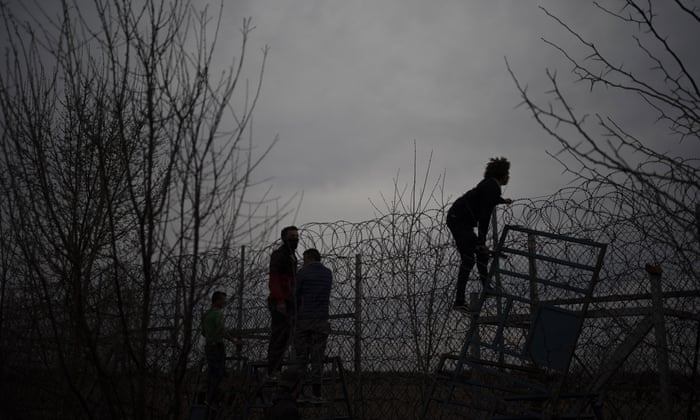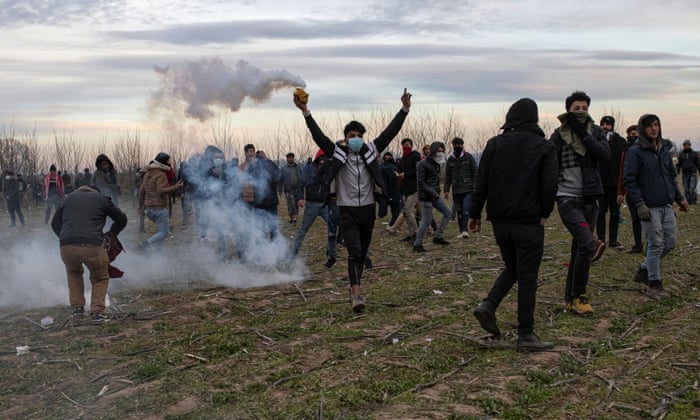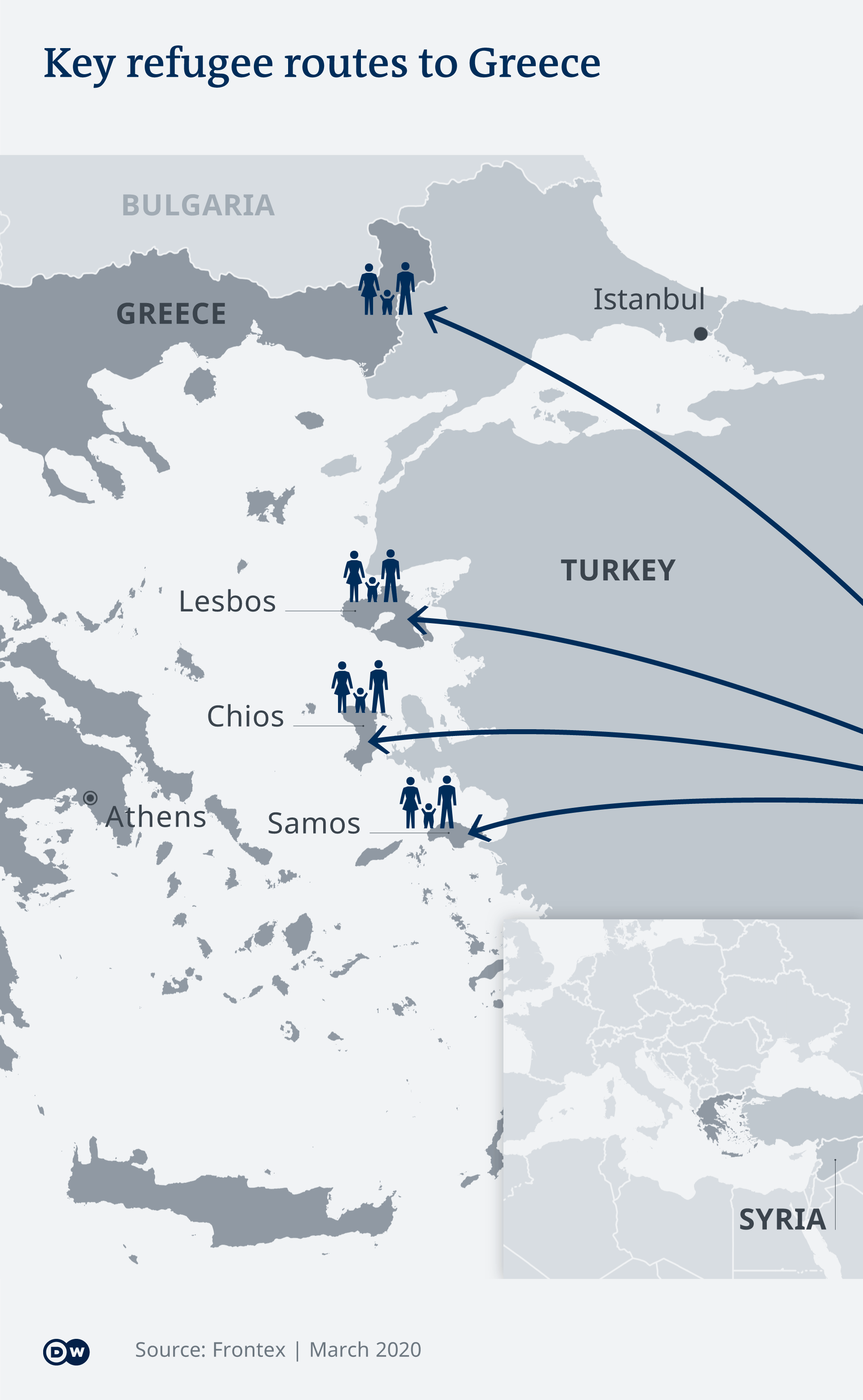Turkey's Erdogan Correcting EU/NATO Deficiencies
"The crisis stemming from Syria, with its security and humanitarian aspects, is threatening our region and even all of Europe."
"No European country has the luxury to remain indifferent. We expect concrete support from all our allies in the fight that Turkey has been carrying out alone ... NATO is in a critical period during which it needs to clearly show support."
Turkish President Recep Tayyip Erdogan
"Migrants need support, Greece needs support but also Turkey needs support, this involves finding a path forward with Turkey."
"We have expressed very clearly to President Erdogan our intention to move forward, provided this is reciprocal."
"It was the Turkish president who said the European borders were open. They were not open, they are not open."
"Finding a solution to this situation will require relieving pressure put on the border. It will require supporting both Greece and Turkey, with the pressure they are under."
"The events at the Greek-Turkish border clearly point to politically motivated pressure on the EU's external border."
Ursula von der Leyen, head, European Commission
 |
| Asylum seekers are seen in the Moria Camp as they continue to wait to reach Europe in Lesbos Island, Greece, on March 09, 2020. Ayhan Mehmet / Anadolu Agency via Getty |
Relations between Turkey and Greece have never been relaxed and they are now more tense than ever. For the most part, Turkey can be recognized as an aggressive, bad-tempered neighbour to Greece. As it is, in fact, to the entirety of the European Union, despite that Ankara has for many years knocked at the door of the EU, to allow it to enter. As it is, hordes of its expatriates have long since ensconced themselves in Europe, primarily in Germany, originally as 'guest' workers, now resident/citizens, but Recep Tayyip Erdogan considers them still Turkish citizens.
Mr. Erdogan's footprint in Europe is rather large; aside from his continual demands and accusations directed at Europe, he has funded and built many very large and very visible mosques for 'his' Turkish citizens and criticized Europe for its treatment of Turks. Now Greece and Turkey employ their riot police on their shared border to fire tear gas; Greek police at the unwanted thousands of migrants desperately attempting to breech the fence separating the two countries, and Turkey's police at their Greek counterparts and to create a fog to help migrants slip across undetected.
Over ten thousand migrants have been attempting a border breach ever since Turkey a week earlier warned it had no intention to continue respecting the 2015 agreement with the EU to stem illegal migration flows to Europe in exchange for aid in the amount of billions of euros. Athens and Ankara are on a migrant-repulsing war footing. Greek army trucks with loudspeakers warn migrants the border is closed. Turkey incites the migrants to try a little harder.
 |
| Migrants and refugees attempt to scale the border fence from Turkey into Greece. Photograph: Felipe Dana/AP |
EU foreign policy chief Josep Borrell spoke of the situation as "unacceptable", urging Ankara to stop encouraging more migrants to illegally enter the EU, offering an additional $90 million in aid for northwest Syria's vulnerable population. Another $1 billion of new aid was announced to go to Athens to help them cope with the migrant crisis. Understandably, EU leaders quake at the very thought of a repeat of the 2015-16 crisis when over a million migrants entered western Europe through Turkey and the Balkans, straining security and welfare services.
Turkey's accusation is that the EU has fallen short of its commitments through the migrant agreement which called for Turkey to halt the flow of Europe-bound migrants and refugees, with the EU agreeing to provide $9.4 billion in aid for Syrian refugees. Turkey also demanded that the EU fast-track the long-withheld membership Turkey is anxious to achieve, and to agree to visa-free travel for Turkish citizens to Europe.Erdogan announced on February 28 that Ankara meant to release itself from the agreement, by urging migrants to head to Greece.
 |
| A man picks up a teargas canister fired by police near the Greece-Turkey border. Photograph: Marko Đurica/Reuters |
Emphasizing Turkey's reversal and helpfulness to the migrants, many were rallied out of the camps and driven by bus to the Greek-Turkey border. Resulting in about 35,000 migrants massing themselves for entry to Greece where resources and patience are already strained with the presence of 42,000 refugees and migrants on the Greek islands, 5,500 unaccompanied children among them. France, Portugal, Finland, Germany and Luxembourg have offered to take up 1,500 children between themselves.
To the present, the EU has given Turkey $4.7 billion, representing half of the promised financing to aid Turkey in paying for housing, schools and medical centres for refugees on its territory. "A precondition for any additional EU help should be to stop all support to illegal border crossings and move people away from the border", was the considered opinion of Manfred Weber, a German conservative member of the European Parliament.
When the July 2015 botched coup to remove Erdogan from power took place, the EU was startled by the scale of Erdogan's violent crackdown following the attempted coup. The breadth and reach of arrests and imprisonments of tens of thousands of police, lawyers, judges, teachers, journalists and others led to the stalled bid to join the bloc, going into deep freeze.

Labels: European Union, Greece, Migrants, Refugees, Turkey

<< Home